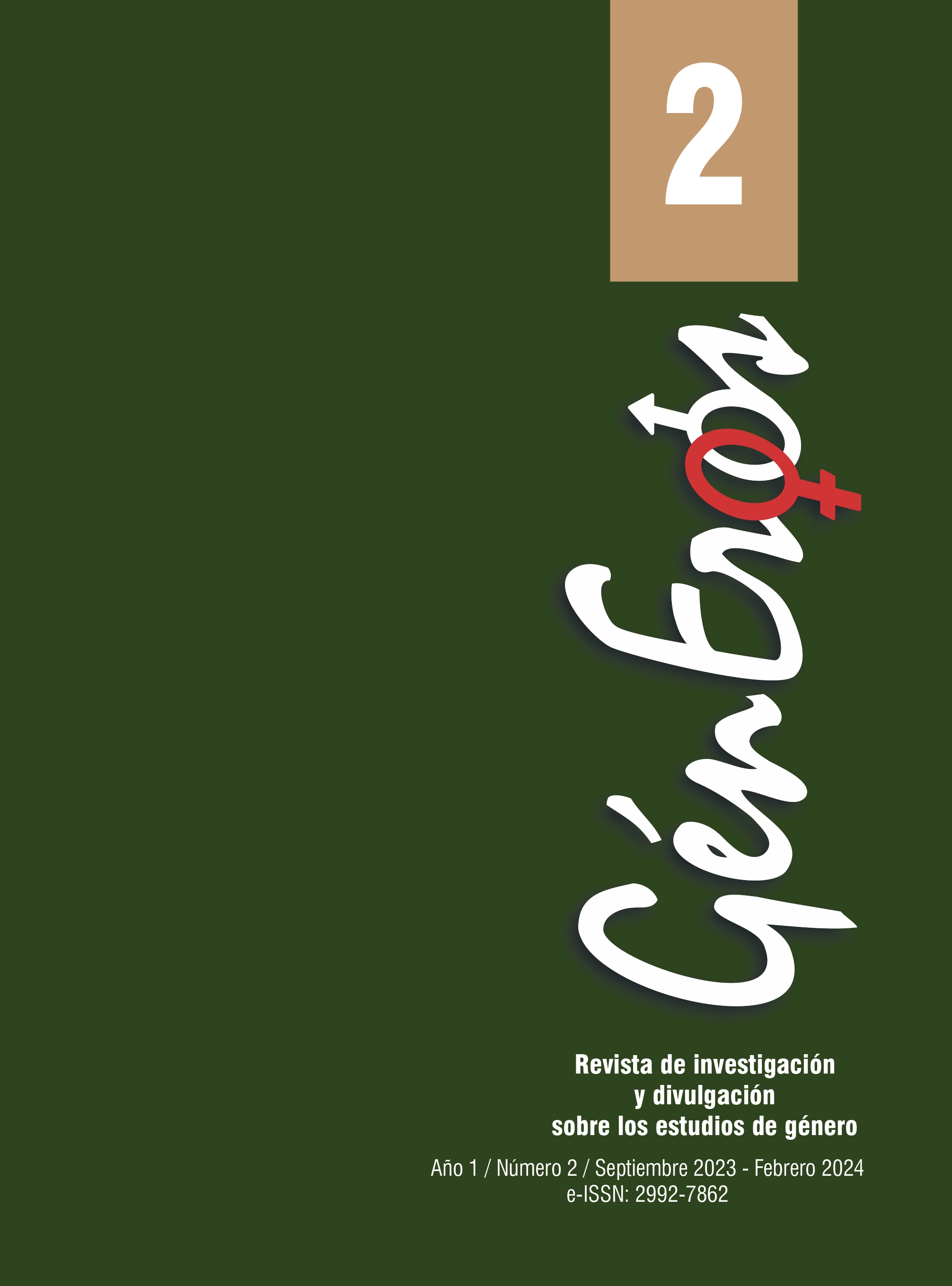Building the World: Towards a Genealogy of Feminist Women in Hip Hop Culture Mexico
DOI:
https://doi.org/10.53897/RevGenEr.2023.02.05Keywords:
rap, feminism, hip-hop, culture, MexicoAbstract
In 2014, in Mexico, a movement of feminist rappers began to take shape, revealing how important changes were taking place within the hip hop culture. The presence of feminist women in this cultural proposal, characterized worldwide by four elements like rap, breaking, DJing and graffiti, highlighted the great transformations that were taking place in the culture that was born in the Bronx, in New York in the 1970s. These changes are articulated to the worldview of hip hop that considers the “construction of a better world”, which, together with its four artistic practices and the presence of feminisms, configure what is currently known as feminist hip hop in Mexico. Throughout this text we seek to answer the general question posed: what is the genealogy of feminist women
involved in hip hop culture in Mexico? As part of the objectives is to understand the particularities of enunciation and the forms of organization that women build in this culture, and finally, to identify the specificity of the knowledge built by feminist women in hip hop. The space of the hip hop party is also analyzed as a place for the configuration of a feminist pedagogy in Mexico. The results show that the presence of feminism in hip hop culture lives within the framework of activism linked to the Fourth Wave of Feminism
at a global level.
Downloads
Metrics
References
Álvarez, S. (2019). Feminismos en movimiento, feminismos en protesta. Revista Punto Género, 11: 73-102. https://revistapuntogenero.uchile.cl/index.php/RPG/article/view/53881/56640
Berger, P.L. (1969). El dosel sagrado. Elementos para una sociología de la religión. Amorrortu Editores.
Blackman, Sh.J. (1998). The School: ‘Poxy Cupid‘›an Ethonographic and Feminist Account of a Resistant Female Youth Culture: The New Wave Girls. En: Skelton Tracey y Valentine Gill (eds.), Cool Places. Geographies of Youth Culture. Londres y Nueva York, Routledge.
Chang, J. (2014). Generación hip hop. De la guerra de pandillas y el grafito al gangsta rap. Caja Negra.
Chaparro, A. (2022). Las olas feministas, ¿Una metáfora innecesaria? Korpus 21, II(4): 77-92. https://doi.org/10.22136/korpus21202284
Cochrane, K. (2013). The Fourth Wave of Feminism: Meet the Rebel Women. The Guardian. Tue 10 Dec 2013. https://www.theguardian.com/world/2013/dec/10/fourth-wave-feminism-rebel-women
Cruz, D. (2020). Feminismos comunitarios territoriales de Abya Yala: Mujeres organizadas contra las violencias y los despojos. Revista Estudios Psicosociales Latinoamericanos REPL, 3 (1): 8-202. https://journalusco.edu.co/index.php/repl/article/view/2581/3983
Díez Salvatierra, C. (2016). Feminismos activistas en el rap latinoamericano: Mare (Advertencia Lírika) y Caye Cayejera. Ambigua, Revista de Investigaciones sobre Género y Estudios Culturales, 3: 39-57.
Frasco, L. y Toth, F. (2008). La génesis del hip hop: Raíces culturales y contexto sociohistórico. IX Congreso Argentino de Antropología Social. Facultad de Humanidades y Ciencias Sociales, Universidad Nacional de Misiones, Posadas. https://cdsa.aacademica.org/000-080/454.pdf
Foucault, M. (1980). Microfísica del poder. La Edición de la Piqueta.
Garrido, A. (2021). La construcción de paz en Colombia: Sin mujeres, no hay paz posible. Cuadernos de Gobierno y Administración Pública, 8-2: 71-81. Ediciones Complutenses. https://doi.org/10.5209/cgap.78362
Iglesias, L. y Rodríguez A. (2014). La cultura hip hop: Revisión de sus posibilidades como herramienta educativa. Teoría de la Educación, 26 (2): 163-182. Ediciones Universidad de Salamanca. https://revistas.usal.es/index.php/1130-3743/article/view/teoredu2014261163182/12719
Lara, N.L. (2018) Las mujeres y sus prácticas discursivas en la cultura hip hop en México: Un estudio en torno a las manifestaciones de agencia y resistencia genéricas. Tesis doctoral. Programa de Posgrado en Ciencias Políticas y Sociales. Universidad Nacional Autónoma de México.
Lamas, M. (2021). Dolor y política. Sentir, pensar y hablar desde el feminismo. Océano.
Magallón C. (2006). Mujeres en pie de paz: Pensamiento y prácticas. Siglo XXI.
Mansilla, N. (2020). Música y política. El hip hop como contracultura y su nacimiento de la mano del movimiento negro. La Izquierda Diario. https://www.laizquierdadiario.mx/El-hip-hop-como-contracultura-y-su-nacimiento-de-la-mano-del-movimiento-negro#:~:text=El%20Hip%2DHop%20nace%20de,de%20expresi%C3%B3n%20del%20descontento%20social.
McRobbie, A. y Garber, J. (1976). Girls and Subcultures. En: Stuart Hall y T. Jefferson (Eds.), Resistance through Rituals: Youth Subcultures in Post-War Britain. Routledge. Birmingham. https://dodgeengl106.files.wordpress.com/2012/02/girls.pdf
Moraga. M.; Solorzano, H. (2005). Cultura urbana hip-hop. Movimiento contracultural emergente en los jóvenes de Iquique. Última Década, 23: 77-101.
Nateras, A. (2002). Jóvenes, culturas e identidades urbanas. UAM-I/Porrúa.
Ortner, Sherry B. (1979) ¿Es la mujer con respecto al hombre lo que la naturaleza con respecto a la cultura? En: Olivia Harris y Kate Young (Compiladoras), Antropología y feminismo (pp. 109-131). Editorial Anagrama.
Sánchez, E.I. (2016). hip hop y rap: Medios de identificación social en los jóvenes del Distrito Federal: Reportaje. Tesis. Licenciatura en Ciencias de la Comunicación. Universidad Nacional Autónoma de México. Facultad de Estudios Superiores Aragón. Disponible en: http://132.248.9.195/ptd2016/abril/0744034/0744034.pdf
Silva, D.A. (2017). Somos las vivas de Juárez: Hip-hop femenino en Ciudad Juárez. Revista Mexicana de Sociología (79): 147-174. México. ISSN: 0188-2503/17/07901-06 https://www.scielo.org.mx/pdf/rms/v79n1/0188-2503-rms-79-01-00147.pdf
Reguillo, R. (2000). Las culturas juveniles: Un campo de estudio; breve agenda para la discusión. En: M. Carrasco (comp.). Aproximaciones a la diversidad juvenil. El Colegio de México. Centro de Estudios Sociológicos.
Rose, T. (1994). Black Noise: Rap Music and Black Culture in Contemporary America. Middletown, Wesleyan University Press.
Tijoux, M.E.; Facuse, M. y Urrutia, M. (2012). El hip hop: ¿Arte popular de lo cotidiano o resistencia táctica a la marginación? Polis. Revista Latinoamericana, 11 (33): 429-450. https://www.scielo.cl/scielo.php?script=sci_arttext&pid=S0718-65682012000300021
Toner, Anki (1998). Hip hop. Celeste, España.
Vargas, G. (2010). La cosmovisión de los pueblos indígenas. Universidad Veracruzana.
Wiki Rap Hip Hop (2022). El término de la palabra. https://rap.fandom.com/es/wiki/hip_Hop
Published
How to Cite
Issue
Section
License
Copyright (c) 2023 Nelly Lucero Lara Chávez

This work is licensed under a Creative Commons Attribution-NonCommercial-ShareAlike 4.0 International License.
GénEroos Magazine allows you to share, copy and redistribute the material in any medium or format; adapt, remix, transform and build upon the material, crediting the work appropriately and providing a link to the licence, indicating if changes have been made.












